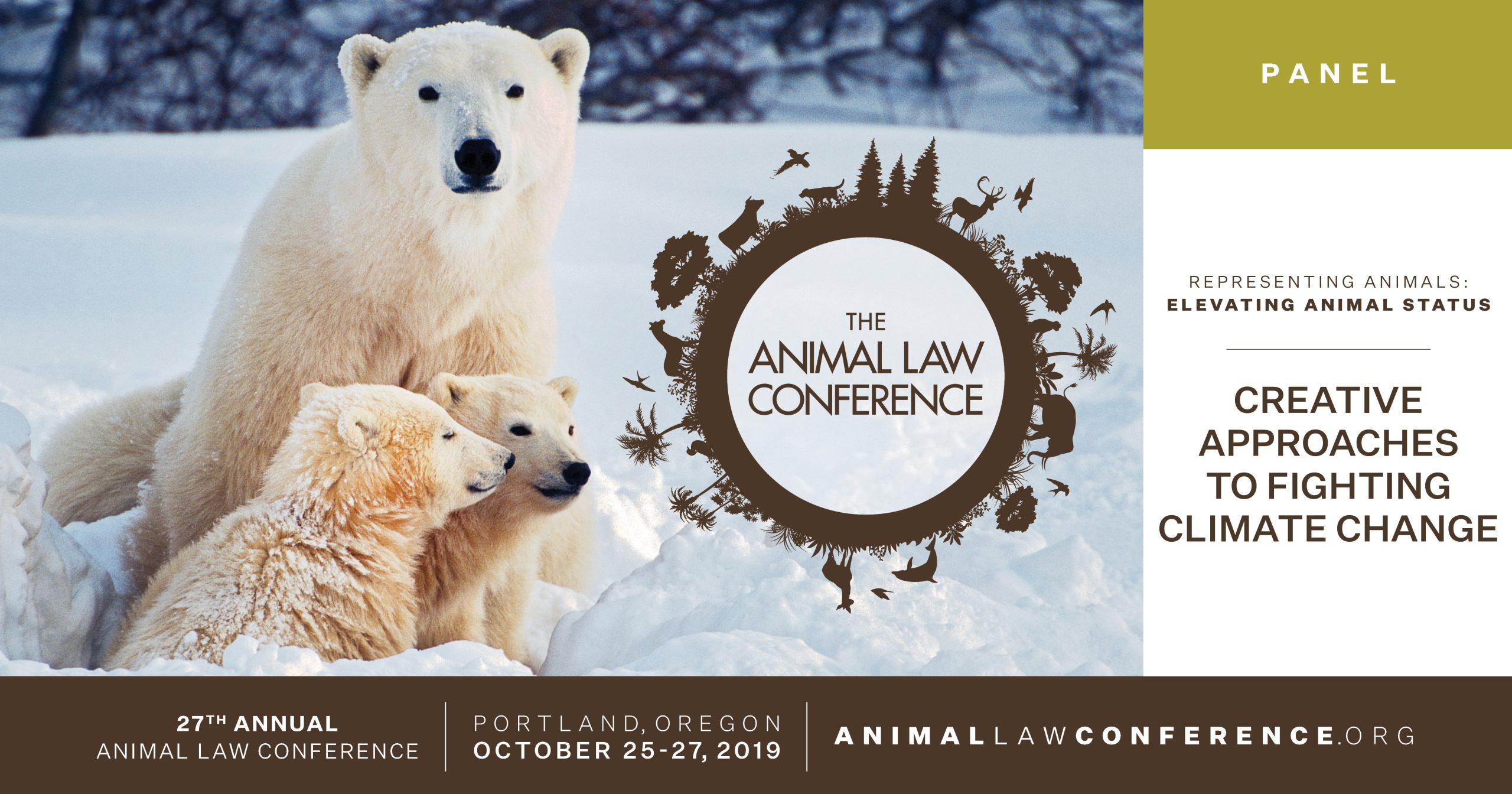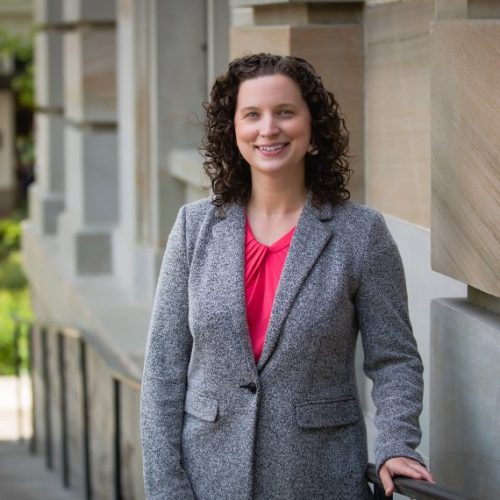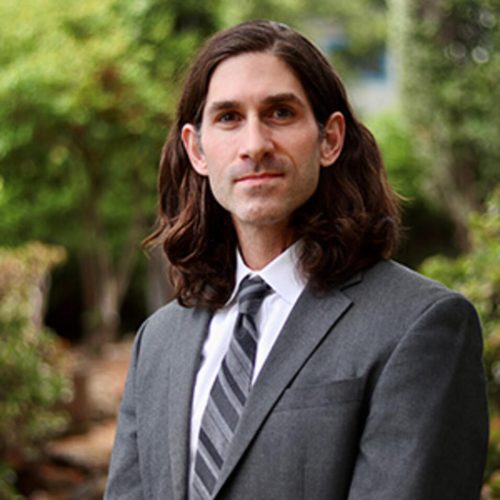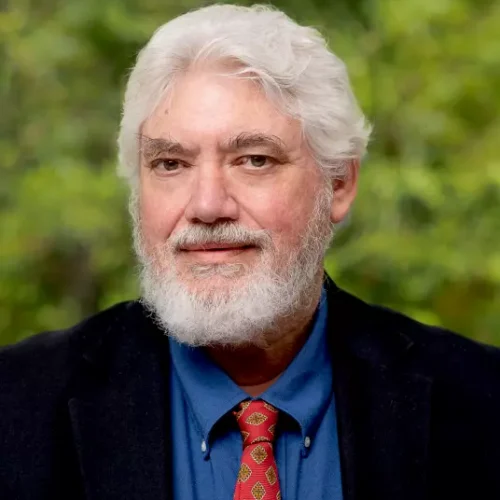The 27th annual Animal Law Conference brought together over 390 in-person registrants in Portland, Oregon for a weekend of education, discussion, and strategic insight centered on transforming the legal status of animals. Held October 25–27, 2019, the event featured a range of panels, keynotes, and networking opportunities that reflected the growing depth and global scope of the animal law movement.
Dates & Location
October 25–27, 2019
Pure Space
Portland, Oregon
Registration
Total registrants: 392
Legal Professionals: 119
Law Students: 163
Nonprofit/Public Interest: 39
Animal Activists: 71
Our Sponsors


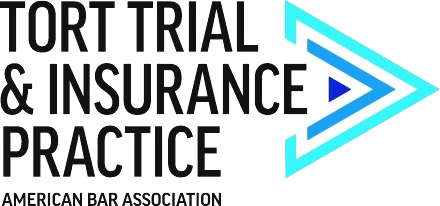
Highlights & Reflections
The conference opened Friday evening with a welcome reception and keynote presentation from Congressman Earl Blumenauer, co-chair of the Congressional Animal Protection Caucus. His remarks highlighted key federal legislative efforts and the importance of advocacy within the political process to improve animal protection laws.
Saturday’s programming began with an overview of the legal status of animals and moved into in-depth discussions on topics including animal sentience and ethics, criminal justice system reform, civil litigation strategies, and international legal developments. Sessions explored how evolving scientific understanding and legal theory are reshaping animals’ treatment under the law.
The day concluded with a banquet dinner and keynote presentation by Professor Maneesha Deckha, who discussed Canada’s recent pro-animal legal developments, including the country’s new cetacean anti-captivity law, and how these changes might inspire progress in other jurisdictions.
On Sunday, concurrent sessions covered a range of topics from clinical legal education and youth engagement in animal law, to emerging intersections between technology, artificial intelligence, and nonhuman personhood. Panels also explored legislative strategies, climate litigation, and ethical challenges in animal law practice.
The 2019 Animal Law Conference continued its tradition of bringing together legal professionals, scholars, students, and advocates for thoughtful and substantive engagement on the most pressing issues in animal law. As the field continues to evolve, the conference remains a vital forum for sharing expertise, strengthening connections, and advancing protections for animals across legal systems worldwide.
2019 Photo Album
Friday
Welcome Reception
The conference kicked off with an evening reception and keynote presentation at Pure Space in Portland’s Pearl District.
Guests enjoyed appetizers and drinks while networking with fellow conference attendees.
1315 NW Overton St, Portland, OR 97209
Welcomes & Introductions
Keynote Presentation by Congressman Earl Blumenauer
During his impressive career in public service, Congressman Earl Blumenauer has inspired and supported his constituents and citizens across the country with his tireless advocacy of important issues such as public transportation, land use planning, protection of the environment, and school funding. Animal welfare has also been a priority for the Congressman throughout his career, having sponsored or co-sponsored over a dozen bills that have improved the lives of animals and furthering this work as co-chair of the Congressional Animal Protection Caucus. This keynote presentation will highlight Congressman Blumenauer’s ongoing legislative work, including the priority bills of the Congressional Animal Protection Caucus, as well as other key animal welfare initiatives on Capitol Hill. The Congressman will also share his perspective about recent administrative decisions and actions as well as other important and timely issues.
Introduction by: Dean Jennifer Johnson, Lewis & Clark Law School
Saturday
Introduction to the Legal Status of Animals
The Animal Law Movement is deeply involved in wide-ranging work that will transform the legal status of animals. This year’s conference will explore how this is playing out in civil, criminal and international law, as well as academia, politics and scientific study.
Introduction by: Pamela Hart, Executive Director, Center for Animal Law Studies at Lewis & Clark Law School
Understanding Our Clients: Philosophy, Ethology and the Law
Moral consideration for animals is still hotly debated despite studies continuing to show that animals are sentient beings who feel pain and seek pleasure. This panel will discuss the ethical theories behind animal protection, how these theories have been bolstered by recent advancements in our understanding of animals, and the ways in which the law has both paved the way and has been led by society’s shifting paradigm on how we treat and view animals.
Break
More than Property: Advancing Animal Status within the Criminal Justice System
There is sometimes a misconception that our ability to protect animals within the criminal justice system is too limited and inadequate to effect real change. But recent developments in criminal law—recognition of animals as victims and sentient beings, burgeoning courtroom animal advocate programs, and cases focused on animals’ emotional suffering—make this an exciting time to be a practitioner in criminal animal law. This panel will explore the numerous ways that animals are considered “more than property” in the criminal justice system and how professionals in the field, from prosecutors to veterinarians, can further this trend and have a real impact on animal victims.
Lunch
Transforming Animals’ Status through Civil Litigation
This panel will discuss the challenges and promises of using civil litigation to transform animals’ legal status. Panelists will discuss high profile animal rights cases, including the Animal Legal Defense Fund’s attempt to establish animals’ right to sue their abusers for damages and the Nonhuman Rights Project’s efforts to win writs of habeas corpus for chimps and elephants. The panel will also explore how civil litigation efforts that may formally fall short of securing fundamental changes to animals’ legal status can nevertheless yield critically important changes to their de facto status and play a role in paving the way toward more fundamental rights in the future.
Break
All the World’s a Stage: Raising the Curtain on International Animal Advancements
Slowly but surely, our legal theater is seeing animals being transformed from mere props and property to players on the global stage. Join these experts as they map this international evolution in animal status and shine a spotlight on the rights, protections, and considerations that are helping to give it shape.
Break
Sound Animal Representation: Navigating Legal Ethics and Compassion Fatigue as an Advocate for Animals
Doing the work of advocating for animals within the legal system can be challenging. Professional ethics hypotheticals are rarely crafted with animal law in mind; nor are legal self-care models explicitly built to account for constant exposure to the visceral injustice faced by animals. In this session, we walk through the basics of compassion fatigue and common ethical quandaries—laying out ways to address each in turn.
Break
Banquet Dinner, Awards and Keynote Presentation
The banquet dinner and evening program took place at Pure Space in Portland’s Pearl District.
1315 NW Overton St, Portland, OR 97209
Banquet Dinner
Animal Legal Defense Fund's Pro Bono Achievement Awards
Keynote Presentation - Inroads and Crossroads: Making Sense of Recent Pro-Animal Developments North of the Border
This keynote presentation will discuss recent favorable developments in Canada on issues relating to animal law – everything from a new cetacean anti-captivity law, to a new national plant-promoting food guide. The talk will explain the revolutionary nature of these developments in Canada, what they mean for animals and Canadian society, as well as the larger cultural change that still needs to occur to keep the momentum growing for animal law reform. These examples from Canada will be highlighted as both lessons learned and cautionary tales for those working to further animals’ legal status on this side of the border.
Introduction by: Pamela Frasch, Associate Dean, Animal Law Program; Founder, Center for Animal Law Studies at Lewis & Clark Law School
Sunday
Animal Law Clinicians: Training the Next Generation
When it comes to learning, nothing beats hands-on experience. Law school clinics create space for law students to dive deeply into a subject while developing essential lawyering skills, unconstrained by the pressures inherent to other settings. This panel will address the development of animal law clinics, the many experiential learning opportunities presented by clinics and related courses, the role of community partners and pro bono attorneys in clinics, and examples of the unique and creative work being done in animal law clinics to simultaneously develop the field of animal law while using service-learning to prepare students to be effective legal advocates.
Electing Representatives who Represent Animals
Animals can’t vote, but that doesn’t mean they shouldn’t have a voice in the political process. Making laws to improve the lives of animals, however, doesn’t just start by introducing a bill. The real work begins by helping animal-friendly candidates get elected and then collaborating with them on issues over time until they can become a true legislative champion. Learn how you can elevate animal-friendly lawmakers to positions of power.
Break
Animals, Robots and Persons yet Unknown
As we learn more about the capacities of nonhuman animals, technology too continues to grow in leaps and bounds. Machines that look like humans and animals have captured the public imagination. Don’t miss out on this discussion on interesting issues at the intersection of animal law and technology.
Creative Approaches to Fighting Climate Change
Climate change is the most salient example of the anthropocene, our current geological age which is marked by the domination of humans over the nonhuman world. That domination must have implications for animals’ status as property, given that the assumption that enabled the anthropocene is that animals and their habitat, i.e. nature, is a human resource to be used. This panel will explore that core question about animal status, using various legal approaches in response.
Closing Remarks
Closing Remarks
The conference presenters submitted the following materials. The materials, although not necessarily written by the individual speakers, are relevant to their panel topics and will be applicable to attorneys seeking continuing legal education (CLE) credits for attending the conference. We did not have binders or CD/DVDs of materials available for purchase at the conference, but attendees are able to access this page via their computer or the Animal Law Conference Mobile App.
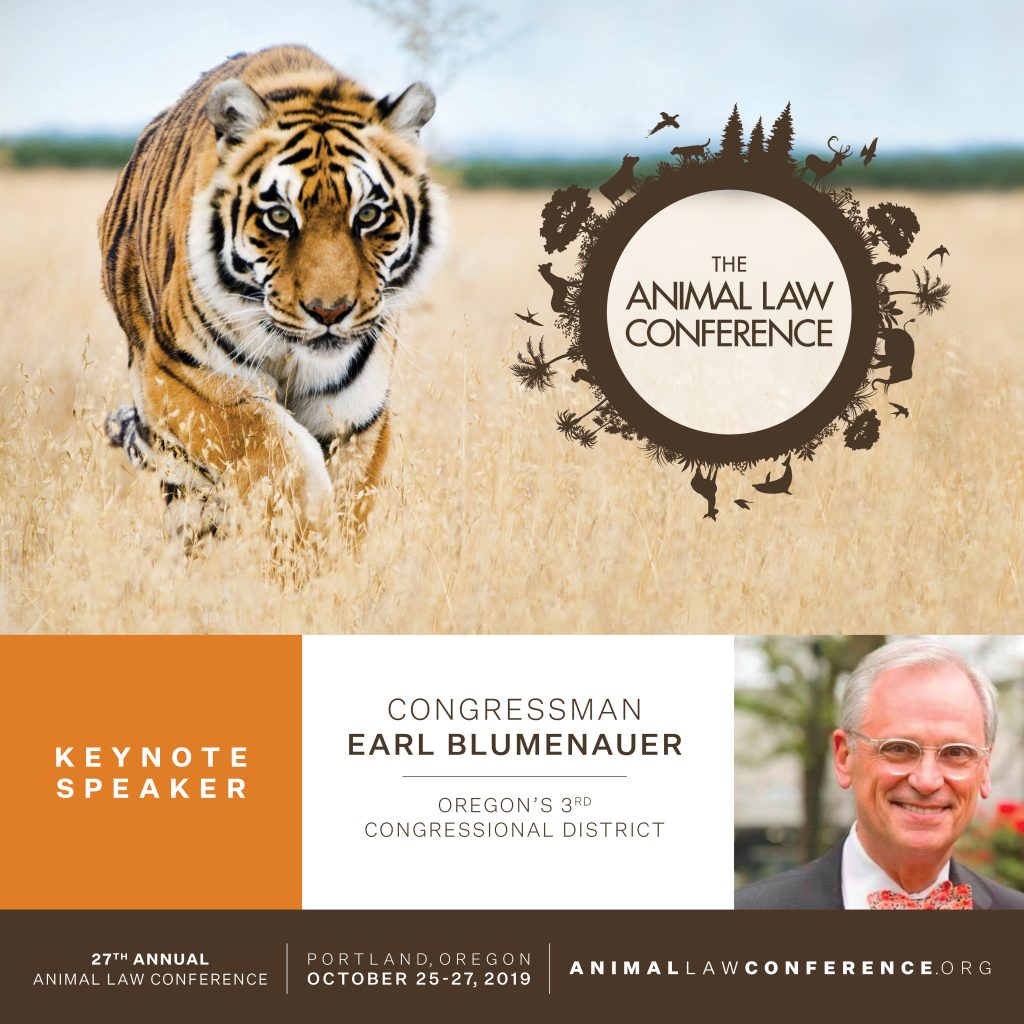
Keynote Presentations
Congressman Earl Blumenauer, 3rd District of Oregon
- Animal protection poised for big wins in new Congress
- PACT Act
- Shark Fin Sales Elimination Act
- Safeguard American Food Exports Act
- PAST Act
- PREPARED Act
- Wildlife Conservation and Anti-Trafficking Act
Maneesha Deckha, University of Victoria Faculty of Law
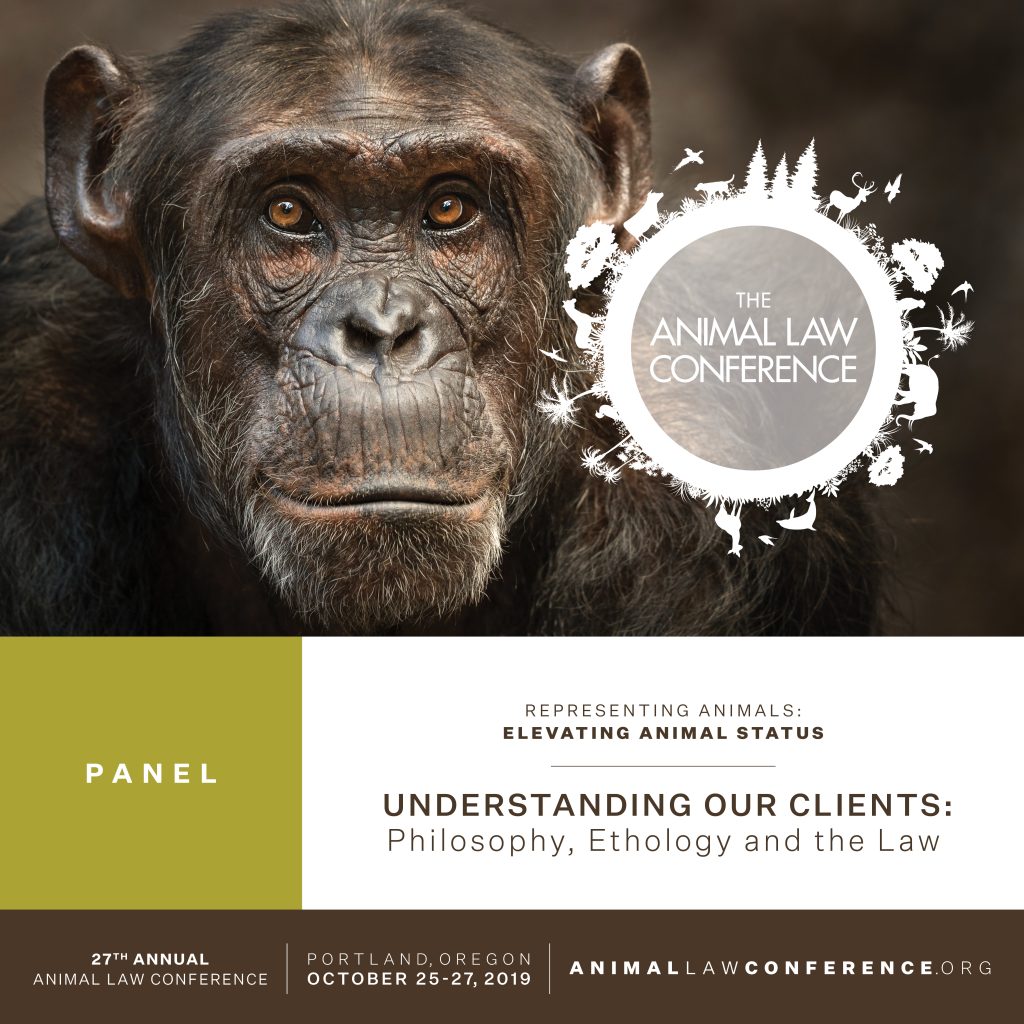
Understanding Our Clients: Philosphy, Ethology and the Law
- Not Quite Property, Not Quote Persons: A ‘Quasi’ Approach for Nonhuman Animals
- Franks PPT – ALC 2019
- Positive Welfare for Fishes: Rationale and Areas for Future Study
- Fish are smart and feel pain: What about joy?
- What do animals want?
- Ilea PPT – ALC 2019
- Intensive Livestock Farming: Global Trends, Increased Environmental Concerns, and Ethical Solutions
- Philosophical Perspectives on Animals
- The Philosophy of Animal Rights
- Equality for Animals?
- Between the Species: The Commonsense Case for Ethical Vegetarianism
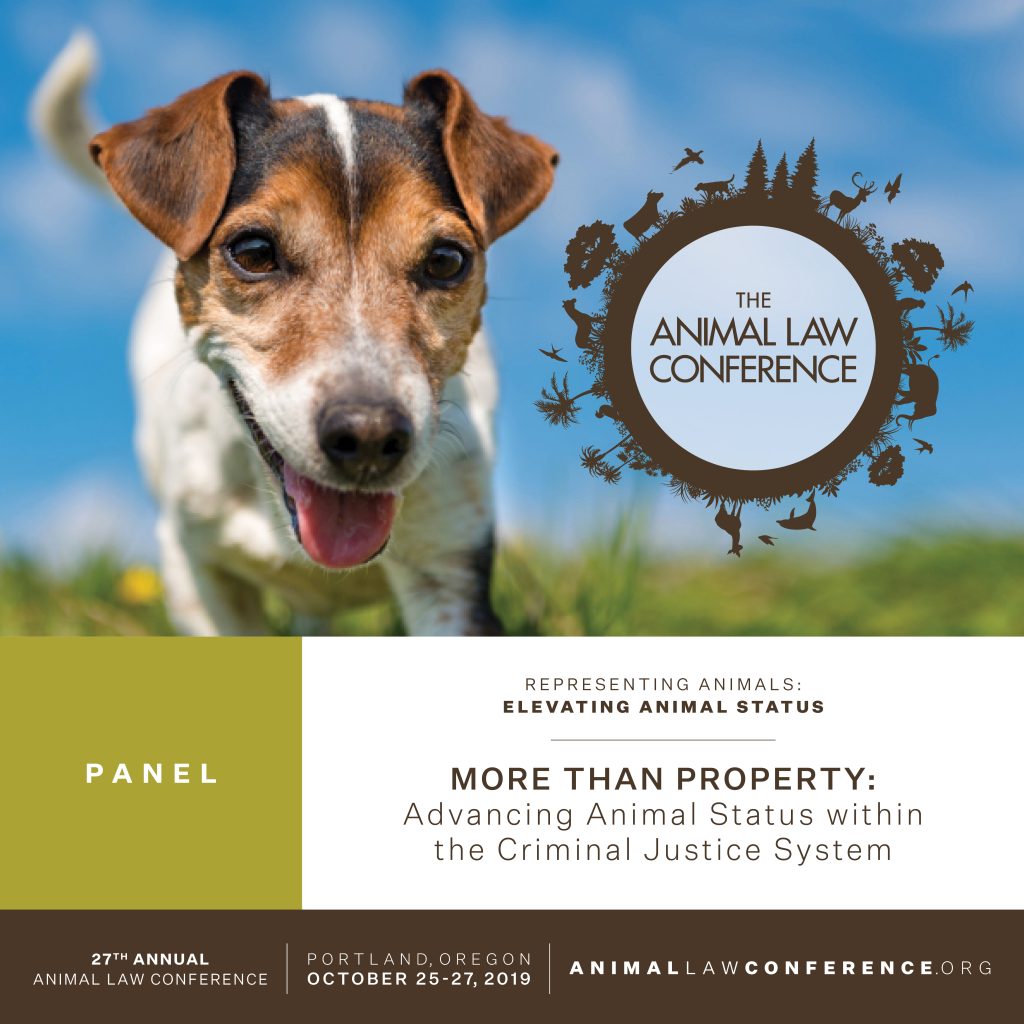
More than Property: Advancing Animal Status within the Crinimal Justice System
- Dunn PPT – ALC 2019
- A Dog is not a Stereo
Posted with permission from the Animal Law Review. Click here for subscription information. - Animal Cruelty Issues: What Juvenile and Family Court Judges Need to Know
- Kamins PPT – ALC 2019
- Merck PPT – ALC 2019
- Forensic Use of the Five Domains Model forAssessing Suffering in Cases of Animal Cruelty
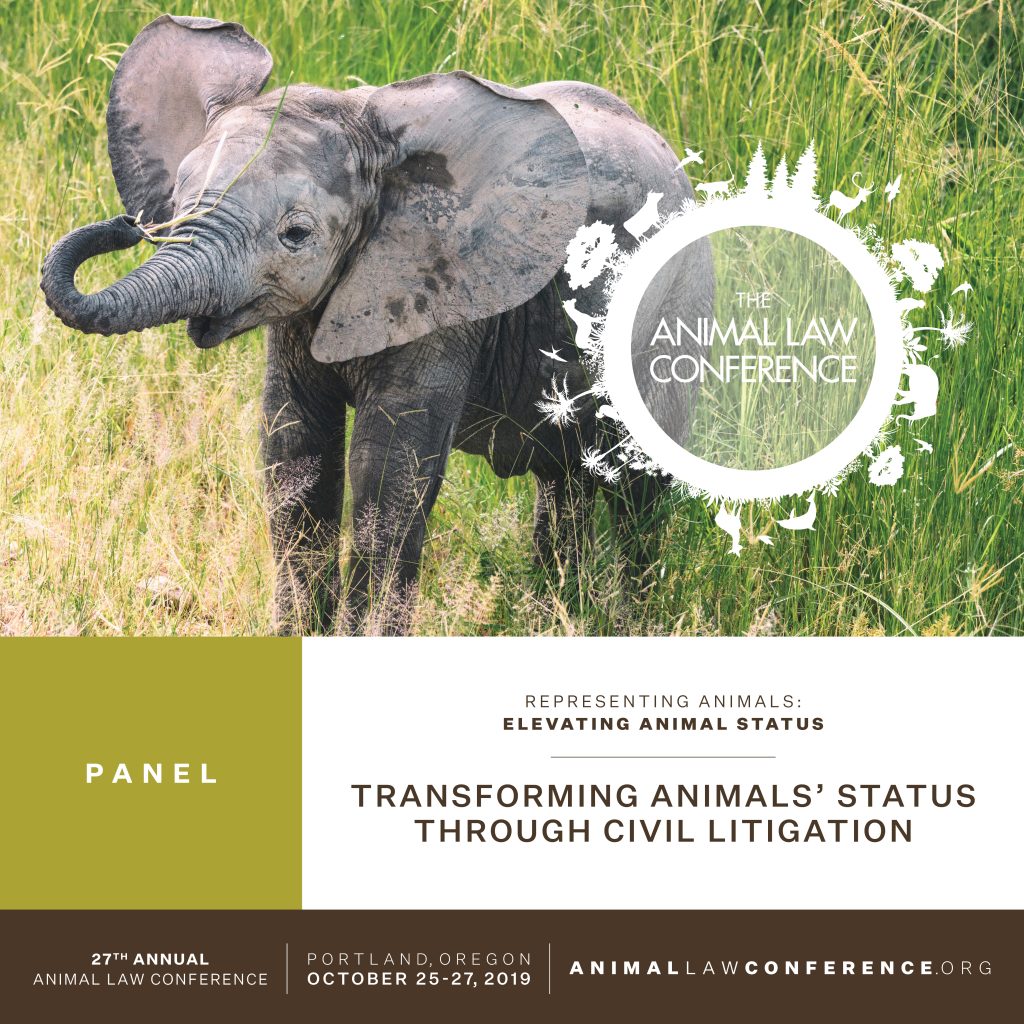
Transforming Animals’ Status through Civil Litigation
- Liebman PPT – ALC 2019
- Justice v Vercher – Appellant’s Opening Brief
- Schneider PPT – ALC 2019
- The Struggle for the Legal Rights of Nonhuman Animals Begins: The Experience of the Nonhuman Rights Project in New York and Connecticut
Posted with permission from the Animal Law Review. Click here for subscription information. - Winders PPT – ALC 2019
- Tilikum v SeaWorld – Complaint
- Tilikum v SeaWorld – Decision
- Naruto v Slater – Complaint
- Naruto v Slater – Opinion
- A Slave by Any Other Name Is Still a Slave: The Tilikum Case and Application of the Thirteenth Amendment to Nonhuman Animals
- Here’s Why the ‘Monkey Selfie’ Case Is Actually a Legal Step Forward for Animal Rights
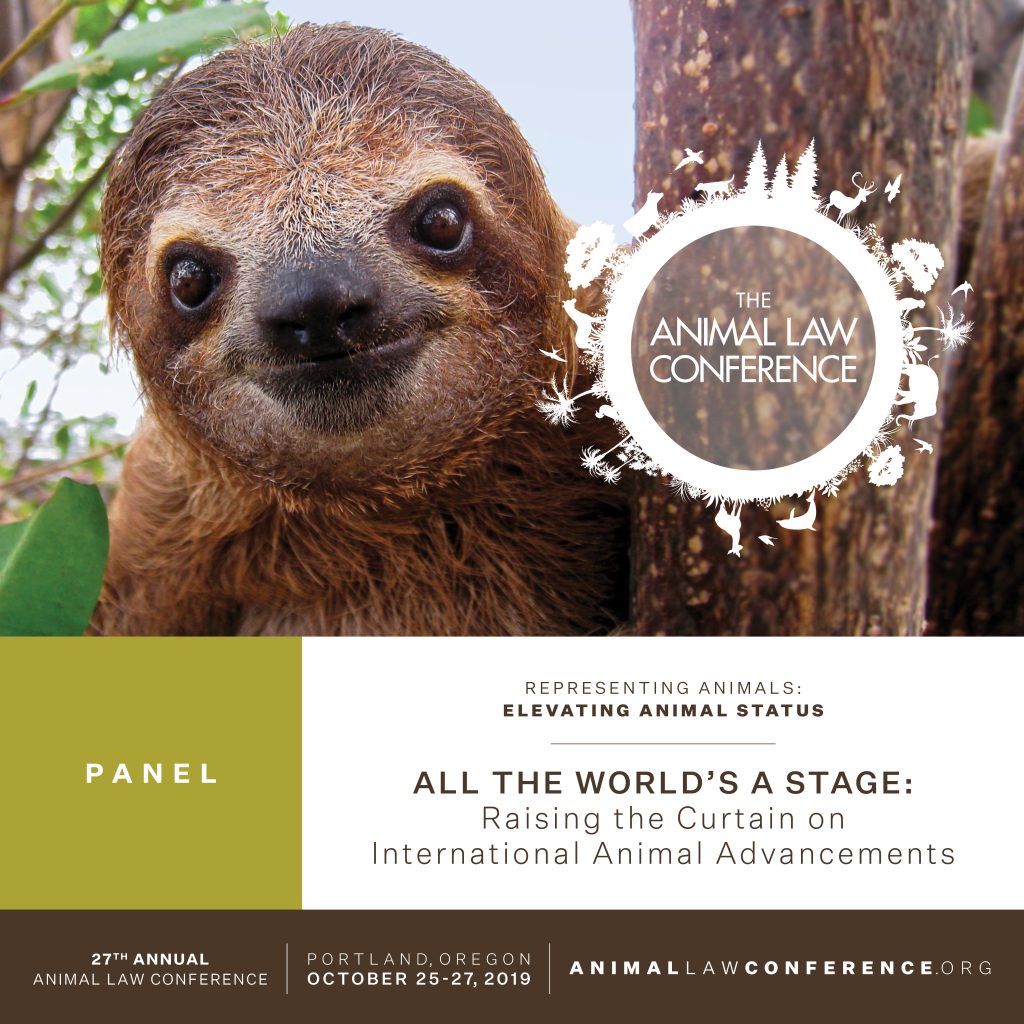
All the World’s a Stage: Raising the Curtain on International Animal Advancements
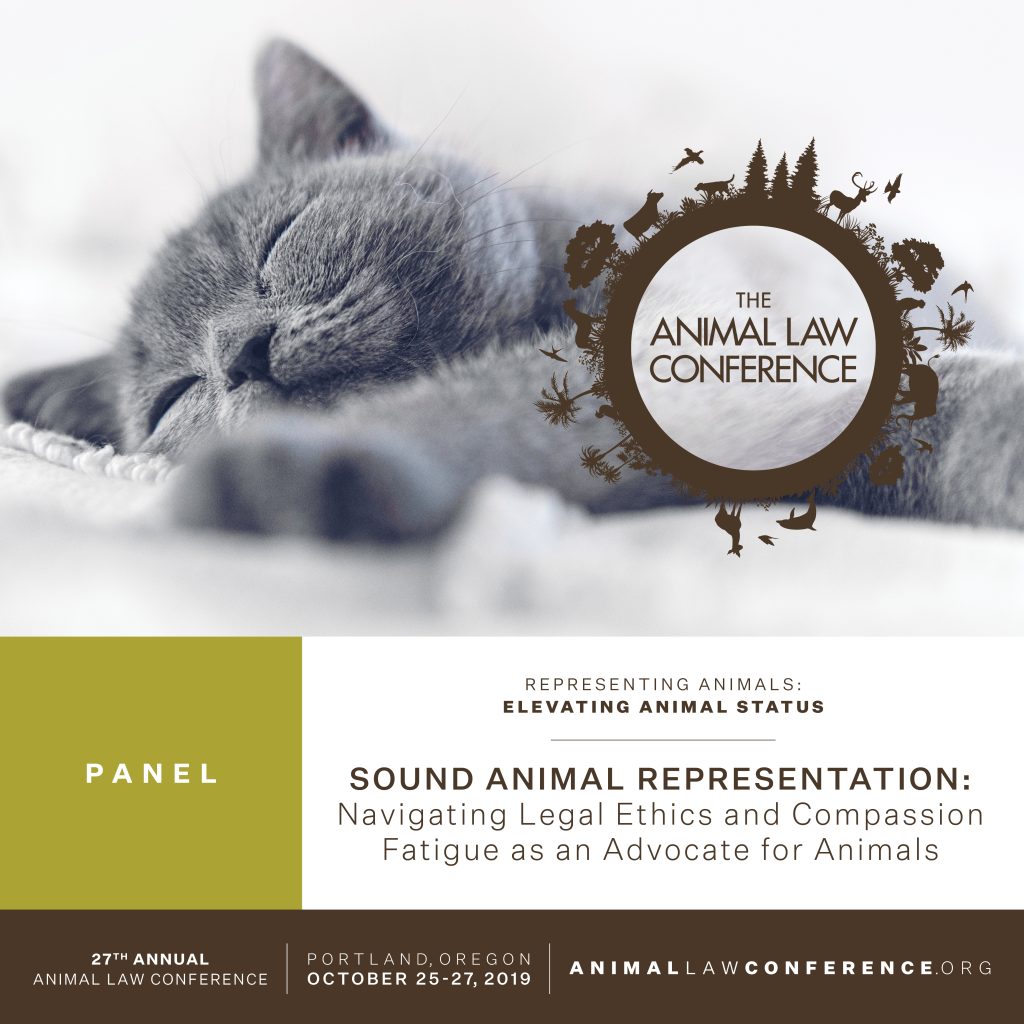
Sound Animal Representation: Navigating Legal Ethics and Compassion Fatigue as an Advocate for Animals
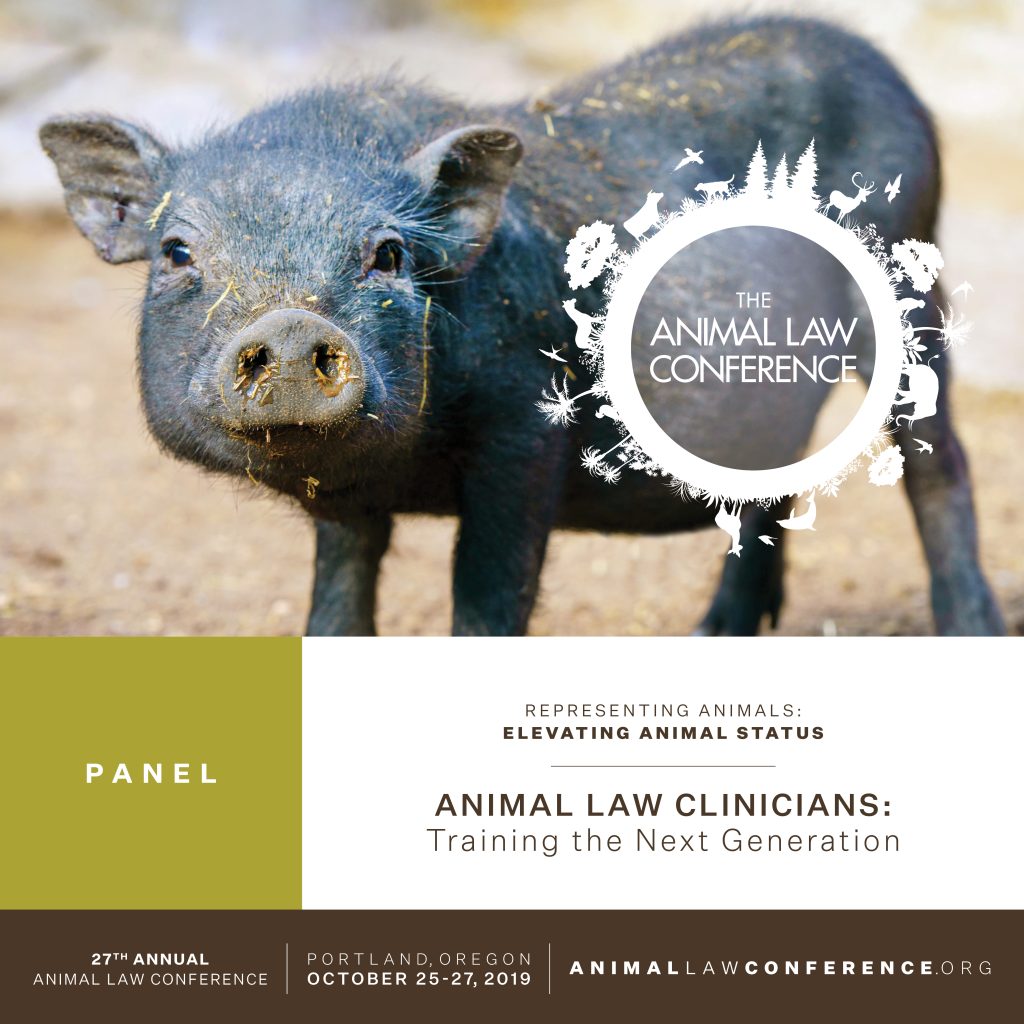
Animal Law Clinicians: Training the Next Generation
- Connolly Hessler PPT – ALC 2019
- The Role of the Animal Law Clinic
- Enriching Animal Law with Restorative Justice Practices: Initial Thoughts on Opportunities for Inclusion
- Protecting Ireland’s Most Threatened Fish
- Restorative Justice and Responsive Regulation
- Building from Scratch: University of Georgia School of Law’s Practicum in Animal Welfare Skills
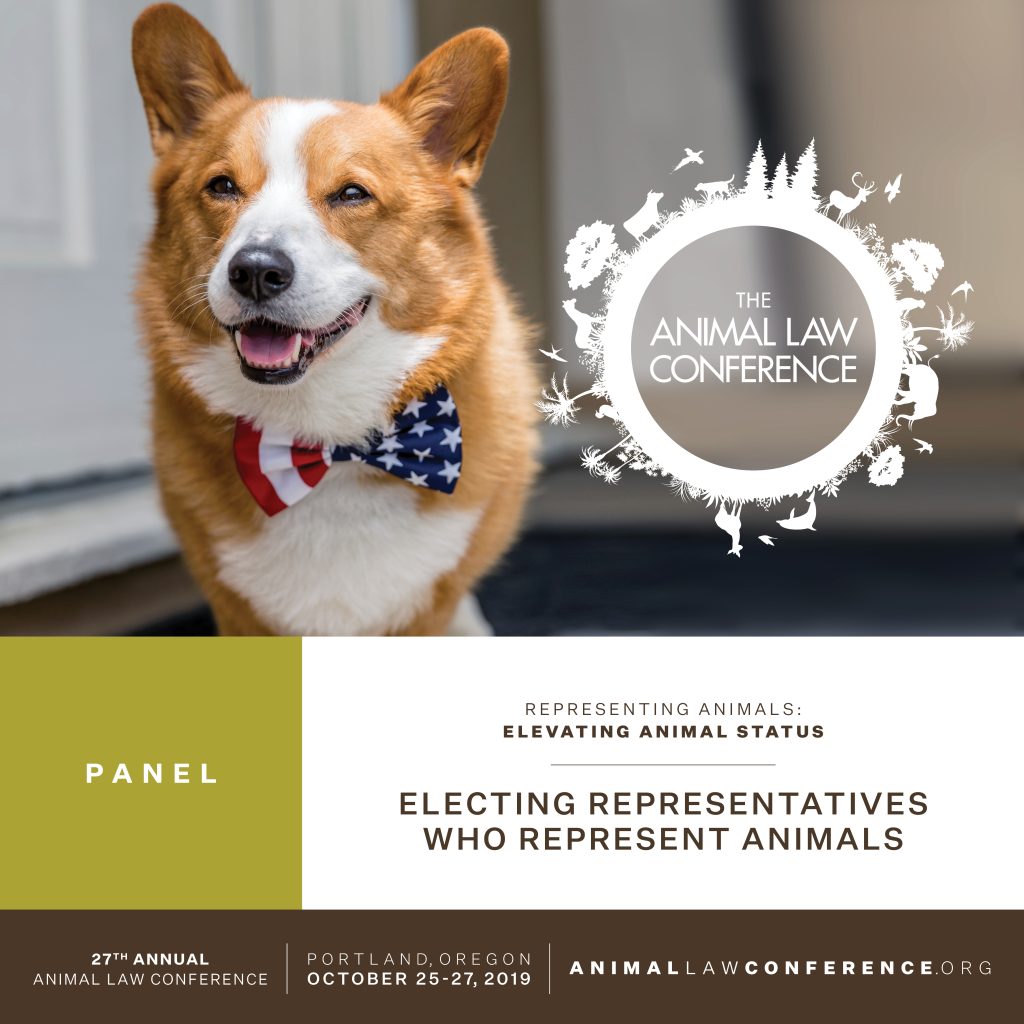
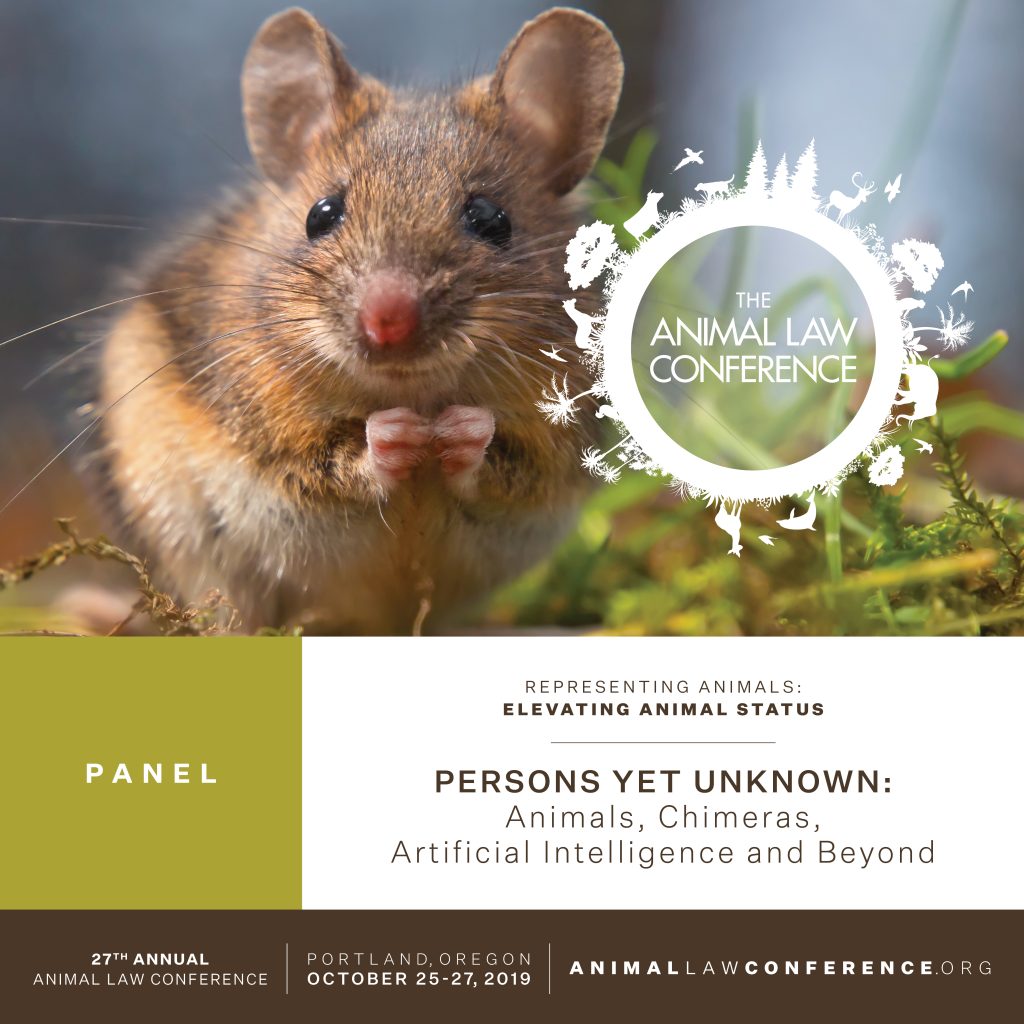
Animals, Robots and Persons yet Unknown
- “Who’s Johnny?” Anthropomorphic Framing in Human-Robot Interaction, Integration, and Policy
- Extending Legal Protection to Social Robots: The Effects of Anthropomorphism, Empathy, and Violent Behavior Towards Robotic Objects
- Do Androids Dream of Asylum? The Blade Runner Films (1982, 2017) and Fear of the ‘Other’
- ‘Please Alexa’: are we beginning to recognise the rights of intelligent machines?
- Object or Subject? The Ongoing ‘Objectification’ of Asylum Seekers
- Long-term relationships as a benchmark for robot personhood
- Legal personality of robots, corporations, idols and chimpanzees: a quest for legitimacy
- Turing’s People: Personhood, Artificial Intelligence and Polular
- The boundaries of legal personhood: how spontaneous intelligence can problematise differences between humans, artificial intelligence, companies and animals
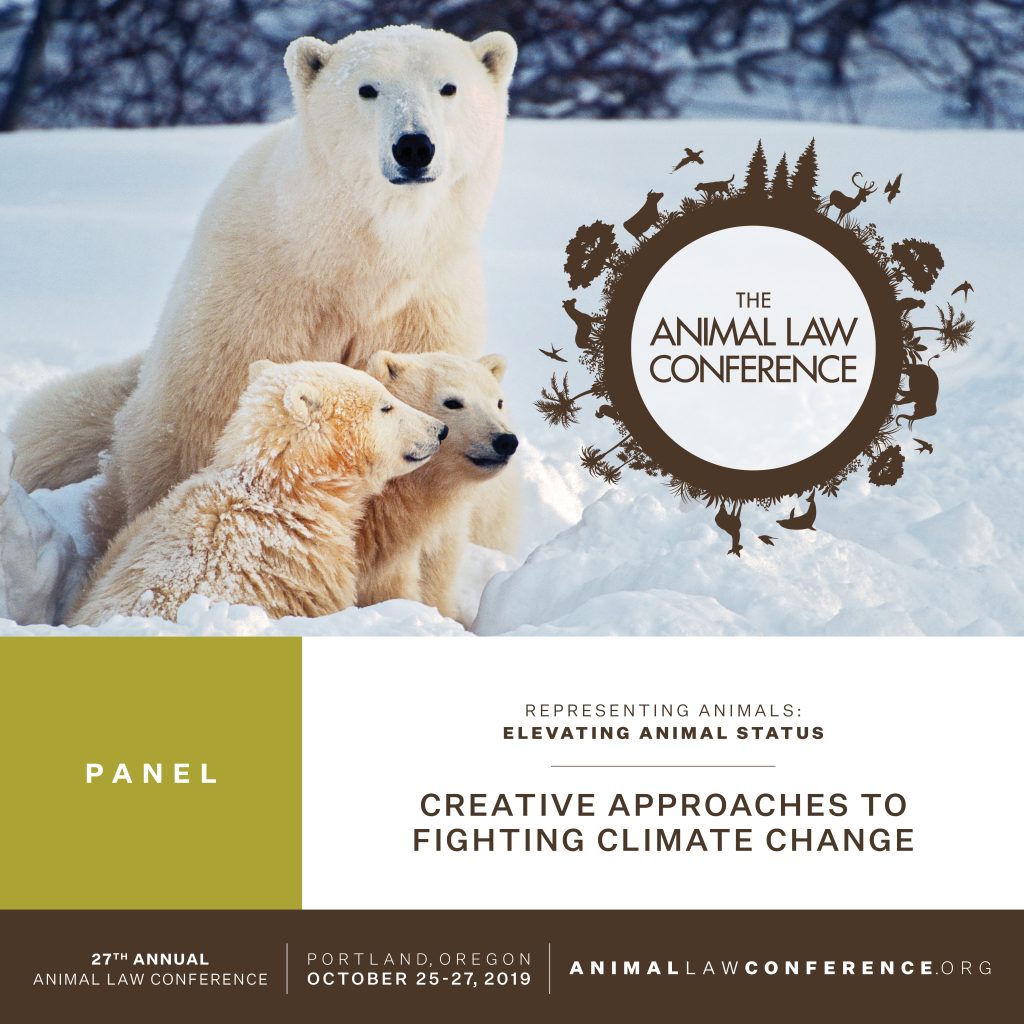
Creative Approaches to Fighting Climate Change
- Abate PPT – ALC 2019
- Tackling the Problem of CAFOs and Climate Change: A New Path to Improved Animal Welfare?
- Juliana v United States – Opinion and Order
- ALDF v United States – Motion to Dismiss, Stay
- ALDF v United States – Plaintiffs’ Response to Defendants’ Motion to Dismiss and Alternative Motion for Stay
- ALDF v United States – Final Judgment
- Waltz PPT – ALC 2019
- Dakota Rural Action v USDA – Amended Complaint
- Dakota Rural Action v USDA – Joint Status Report
- Dakota Rural Action v USDA – Peterson Declaration
The Oregon State Bar has approved the Animal Law Conference for 10.5 CLE credits, including 1 hour of ethics and 0.5 hours of mental health/substance use credits.
Anyone seeking credit in other states should submit approval paperwork to their local bar association CLE boards or retain the certificate of attendance which we will be providing to attorneys who register for the conference, if their state has a reciprocal agreement with Oregon.
Watch all sessions here
Playlist

28:02

15:47

1:15:04

1:13:59

1:14:05

1:01:21

1:18:29

55:26

1:12:34

1:12:53

1:14:30
